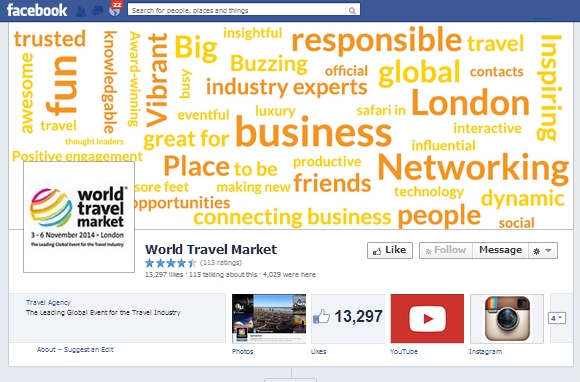Facebook, which has just celebrated its tenth birthday, issued its latest results at the end of January and the results and comments from senior executives contained plenty of messages for anyone using the social network to market their travel businesses. Here are ten things we learned:
- Facebook is mobile-first and is quickly becoming a mobile-only platform. The social network reports on the number of active users, both on a daily and monthly basis. Daily active users in December were 757 million, up by 22%. However, 556 million of these were mobile users and this figure had grown by 49%. There was a similar story on a monthly basis. There are now 1.23 billion monthly active users, 16% higher than in 2012. Of these, there were 945 million mobile users, up 39% year-on-year.
- Facebook is looking east and south. Asia now has 200 million daily active users compared with 105 million two years ago. The rest of the world (excluding North America and Europe) has 216 million users, compared with 109 million at the end of 2011. Revenues, while still dominated by North America, are also growing faster in these non-western markets.
- Likes are easier to come by. On a typical day in December 2013, Facebook users liked more than 6 billion items on the social network. A year previously, the number was 3.8 billion. This growth in likes – some 58% – was faster than the growth in new users.
- People don’t hate Facebook ads. Facebook founder Mark Zuckerberg says that it constantly looks at how to increase the quality rather than the quantity of ads that people see when they are logged into the network. “Our goal is to reach a point where the ads are as relevant and timely as the content your friends share with you,” he said. The company surveys more than 35,000 users every day about their sentiment towards ads and it has found that even as the volume of ads has increased, desktop users are feeling broadly neutral about them while mobile users’ sentiment is improving.
- Facebook ads work. They would say that, wouldn’t they? However, the company has been tracking the effectiveness of a service called Offline Conversion Measurement, which allows companies to see how effective Facebook ads are in making people buy things offline. They do this by anonymously comparing user data such as email addresses and phone numbers between Facebook and the retailer. The network says that its results so far show that ads in the News Feed have an ROI of 8x. Oh, but they did reveal that the effective price per ad has increased by 92% year on year.
- Instagram is really taking off. CFO David Ebersman said that the Instagram user base had doubled year on year. The photo sharing service had a busy year, introducing Instagram Direct (for sharing photos privately), Instagram Video as well as allowing advertisers onto the platform for the first time.
- It’s all getting more personal. Announcing the results, Zuckerberg said,”Before mass media, all business was personal. Sales happened customer-by-customer at the local store or door-to-door. The evolution of mass media made it possible to sell at scale but business was no longer personal. On Facebook, marketers can do both. We are building the world’s first global platform that lets marketers personalize their messages at unprecedented scale.” The company is very focused on developing what it calls Custom Audiences, that lets marketers segment Facebook users in more ways than ever.
- You are going to see fewer cat pictures in the News Feed. Facebook says it recently made a change to the algorithm it uses to decide what content appears in your news feed. Zuckerberg said, “A lot of what our algorithm looks at is straight engagement – the amount of content that people click, like, comment, and share in feed. But what we found was that when we asked people qualitatively what they prefer getting, it didn’t often match up because a lot of things like memes [cat pictures, IQ tests, quotations of the day and so on] got scored very high in terms of getting a lot of people to like them, but weren’t necessarily what they wanted to see … so we ended up doing an adjustment to the algorithm, which made it so that qualitatively things and especially public content and news that people rated as higher quality qualitatively scored more.” The message for marketers is that they should be creating higher quality, native content [i.e. that does not feel out of place among user generated content] in order for it to appear more often in the news feeds of followers and their friends.
- Smart search is the future. Facebook said that it had recently indexed the more than one trillion status updates, including text and photos, that people have shared in the past ten years in the second update to its new Graph Search feature. It says that a mobile version of Graph Search is coming “soon” but that a full rollout, including international versions, is part of a longer-term (three to five year) plan. Graph Search, which lets you search connections and interests in a smart way, is going to be huge for marketers.
- The way we use Facebook could be about to change. Facebook announced the launch of a new app named Paper (below). How retro is that? It allows users to see the newsfeed of stories from both friends and brands in a much more visual way, akin to what users of the Flipboard app will be very familiar. Users can pick topics that they say in this new visual app and move them around with a flick of a thumb. Very exciting for travel with all of its visual content.


